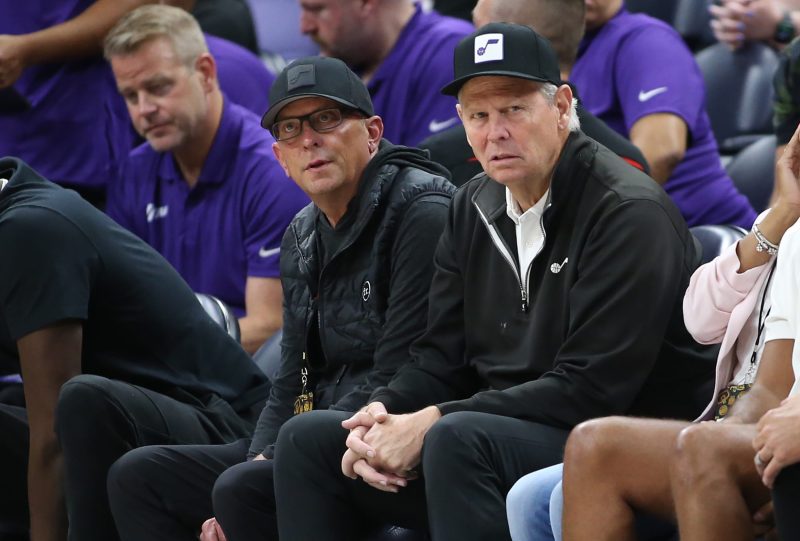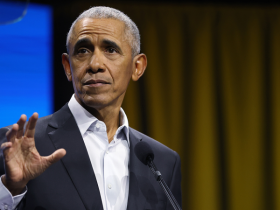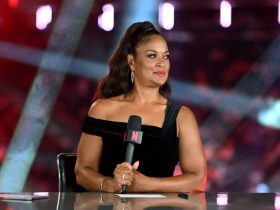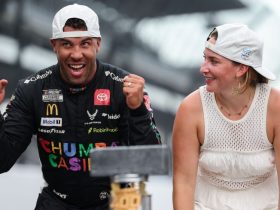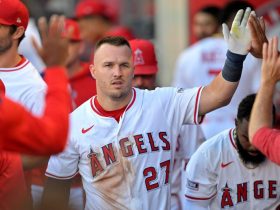Normal remains a part of Utah Jazz general manager Justin Zanik’s life. He travels for work and spends considerable time at the office and with the players, staffers and other team personnel as he navigates the present and future of the franchise.
But life isn’t the same one year after receiving a life-saving kidney transplant.
A daily regimen of 16 anti-rejection and immunosuppressant medicines and supplements. No more sushi because that could lead to food poisoning, which could weaken the immune system, which could lead to kidney failure. Less caffeine and more water to keep the kidney flushed and healthy. One med gives him minor tremors. Another makes him hungry. Doctor appointment after doctor appointment.
“You are given this great gift of life,” Zanik told USA TODAY Sports over Zoom with his wife, Gina, sitting next to him. “And now my job is to do the best I can to take care of it.
“The biggest thing I would say is just you’ve had to develop new habits.”
For most people who have encountered a life-threatening illness, perspective shapes what becomes a new normal. Inconveniences and sacrifices are small pittances for the reward: life.
“We’ve had so much great support. Not only from my lovely wife and my kids, but the Jazz and my colleagues and friends,” Justin said. “I was back in the office right after the combine (in May), got cleared to travel in September, went to Europe three weeks ago for work. So the hours and the work are back to normal, which is still crazy hours. And my body’s held up well. I have a hawk here watching my every move.”
What is polycystic kidney disease?
Justin, 50, has polycystic kidney disease (PKD), an inherited disease in which “clusters of cysts grow in the body, mainly in the kidneys. Over time, the cysts may cause the kidneys to get bigger and stop working,” according to mayoclinic.org.
Eighteen months ago, on Oct. 1, 2023, after Gina persuaded Justin to get a physical following years of putting it off, a doctor called and told him he was in kidney failure.
On April 2, 2024, he received a new kidney from a living donor. The Zaniks, along with their three children, 17-year-old Ava, 15-year-old Oskar and 13-year-old Lucy, celebrated the one-year anniversary last week with a report of good news: the kidney transplant was a success, and Justin is back full-time doing what he enjoys.
“There is just a household of love and just really came together as a cohesive unit to take care of him,” Gina said. “There’s a stronger bond that we just have because of this experience with Justin.”
The Zaniks are not strangers to health issues. Gina is the co-founder and executive director of Rare and Undiagnosed Network, a nonprofit that helps families. Gina and the children have autonomic neuropathy, a condition that impacts involuntary body functions.
Justin prefers to work in the background and his instinct is to remain private. But this is a different situation than making a trade or hiring a coach. Gina is a fighter, trying to get answers and help others, and Justin realized he can help.
Together, they are advocates for organ donations and PKD. All three of their children were diagnosed through genetic testing.
“Ava spoke at the state capitol at 10 years old advocating for rare disease,” Gina said. “She wants to be in public policy. She talked about law school the other day too. She wants to make change in the future for others because of what her journey has been.”
How Justin Zanik found a living donor
Getting a kidney can be a lengthy process that sometimes requires the recipient to undergo dialysis until a match is found. More than 100,000 people are on the waiting list for a kidney, according to the National Kidney Foundation. There are alternatives to the traditional waiting list.
A family or friend can donate directly without going on a waiting list for a kidney from the deceased. There are also kidney donor organizations that help match donors and recipients in an exchange program.
Zanik could not find the right match from family or friends, but a friend, Jeff Hart, had offered a kidney. In short, the kidney registries work this way: when another person donating a kidney in the registry was a match, Zanik would receive that kidney and Hart’s kidney would go to another person. The registry is designed so that a recipient gets a kidney from a living person, which helps increase the life expectancy and minimize medicine and side effects. The Alliance for Paired Kidney Donation worked with the National Kidney Exchange to facilitate Zanik’s transplant.
“The selflessness of that act is just humbling,” Zanik said. “You can’t ever repay someone for that except that this is why we share our story because I can help be an advocate. I can use whatever small platform we have. I can educate people going through the same thing and how we navigated it.”
Since the Zaniks’ three children tested positive for the gene that causes PKD, they may have to deal with that just as their dad and Justin’s father, who received a kidney transplant nearly 20 years ago, did. But there are ways through in vitro fertilization for the Zaniks’ children to prevent their children from having PKD, and they are in close contact with PKD-Free Alliance, which aims to eliminate the disease.
Relishing the future while remembering the past
There are dates that will stick with the Zaniks for a long time. Oct. 1, the date he learned he needed a kidney. April 2, the date Justin received his new kidney, and also the date Gina’s dad died. They are reminders – of what was, what is and what can be.
The Zaniks have taken a pragmatic approach to what at times seems overwhelming: This is part of living, and the way to try to get another day is by addressing it. Zanik is not cured, will be on medicine the rest of his life and remains ever-watchful of how he feels, especially after he was diagnosed with a pulmonary embolism (a blood clot that travels to the lung) on Mother’s Day last year.
There is another side that can’t be measured – the love and support that enveloped the Zaniks. When ESPN first published the story about Zanik’s need for a kidney transplant, he said he received nearly 500 text messages.
“The support we’ve had from our friends, neighbors, ownership, our family, my colleagues, we couldn’t have done it without them,” Zanik said.
He felt a little like the characters in Mark Twain’s classic novel ‘The Adventures of Tom Sawyer’ – when Sawyer and friend Huckleberry Finn attended their own funerals.
“When is the next time you’re going to have people while you’re alive say all these great things about you?” Zanik said. “Unless something bad’s happening to you, no one’s going to say anything great to you out of the blue most of the time.”
He was particularly appreciative of Jazz owner Ryan Smith and Smith’s wife, Ashley; Jazz president Danny Ainge and Ainge’s wife, Michelle; and Jazz coach Will Hardy.
“I was reluctant on sharing my diagnosis,” Zanik said. “It was a big step for me. But I truly believe their confidence in me, their love for me, their love for my family, gave me a lot – not that I didn’t have purpose before in doing this – of purpose that I can go get a transplant. They were, ‘Do what you need to do. We’ve got you.’ That was a huge confidence booster and comfort for Gina and I.”
The Jazz’s season ends Sunday, but Justin still has work. He will attend the draft combine in Chicago and plans to attend the NBA’s Las Vegas Summer League.
“This lifesaving treatment is going to allow me to be around long enough, as long as they’ll have me, to do what I love,” Zanik said. “And that’s trying to accomplish a goal that you can’t accomplish by yourself. And that’s winning a title and doing it with great people.”
The story doesn’t end here for the Zaniks. There is a PKD Center For Excellence in Salt Lake City that provides resources and access to the latest developments in managing the disease.
“What the future looks like is the unknown. Ava turns 18 in June,” Gina said. “The next chapter for us is to not only to have Justin go on and do well, but then focus on our children.”
Follow NBA reporter Jeff Zillgitt on social media @JeffZillgitt

